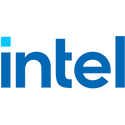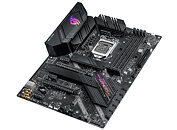Wednesday, February 10th 2021

Intel B460 and H410 Incompatibility with "Rocket Lake" Explained
Earlier this week, Intel shook the DIY PC market, particularly the vast mainstream segment, by revealing that its mid-tier B460 and entry-level H410 desktop motherboard chipsets will not be compatible with 11th Gen Core "Rocket Lake-S" processors, and that only its top-tier Z490 and H470, will. We have an explanation into what's going on, after consulting with people in the know, thanks to our friends at Hardware Zone Israel, who spoke with sources within Intel. It turns out, that some batches of B460 and H410 PCH dies are re-badged from older generations of PCH, and built on the 22 nm silicon fabrication process; whereas the Z490 and H470 are based on a newer generation that's built on 14 nm. This is similar to Intel's move to carve out the B365 chipset from the older H170.
In addition to being limited to an older version of Intel ME (Management Engine), the H460 and H410 PCH lack the ability to communicate with "Rocket Lake-S" processors over side-band, using PMSYNC/PMDN signals, a design change Intel introduced with the "Tiger Lake" and "Rocket Lake" microarchitectures. The chipsets faced no such limitation with "Comet Lake-S." Intel's decision to re-badge older 22 nm-class PCH silicon as B460 and H410 may have been dictated by the company's 14 nm node volume constraints. HotHardware reports that some motherboard vendors, such as GIGABYTE, found a clever (albeit expensive) way around this limitation, by creating "V2" revisions of their existing B460 and H410 motherboards, which actually use the 14 nm H470 chipset.
Source:
Hardware Zone Israel
In addition to being limited to an older version of Intel ME (Management Engine), the H460 and H410 PCH lack the ability to communicate with "Rocket Lake-S" processors over side-band, using PMSYNC/PMDN signals, a design change Intel introduced with the "Tiger Lake" and "Rocket Lake" microarchitectures. The chipsets faced no such limitation with "Comet Lake-S." Intel's decision to re-badge older 22 nm-class PCH silicon as B460 and H410 may have been dictated by the company's 14 nm node volume constraints. HotHardware reports that some motherboard vendors, such as GIGABYTE, found a clever (albeit expensive) way around this limitation, by creating "V2" revisions of their existing B460 and H410 motherboards, which actually use the 14 nm H470 chipset.

59 Comments on Intel B460 and H410 Incompatibility with "Rocket Lake" Explained
Now how can I explain to my friend that his 10400F + B460 combo (which I built) can't be upgraded to 11th gen.
After watching about PCIE 4.0 tested against 3.0, the importance isn't really there.
Had a B450 or B550 ITX board available from my local retail I would have picked up the B550 + 3600 combo, Intel is kinda not worth considering these days.
Since Ryzens took the attention spot, the prices and stocks got worse day by day (after Zen 2 release)
If 3300X was still a thing, AMDs would be further kicking...at least on the gaming side
Would be much nicer if people can pop in a 2nd hand 11900F into their B460 board 4 years from now isn't it.
JFC. Intel go from bad to worse almost every news article, redefining a new lower standard for how much they can abuse consumers each time I read something.
Maybe if I just stop reading the bad will stop getting more bad?
what the interest to rebuy a processor to win 5 % max 10 % at the same level ?
during the same time the old processor lost 30 % price ...to win what ? there is alway 10900 .. in game no must win
in 4 year 2 generation a DDR 5 processor
2generation of apple silicon
next console xbox anonce
for office since 2500k no difference since 10 year i have 2500 k 4770 S 1600 X 10400 F i can compare 10 year for office !!!
in game : only the graphic card is important
expert power ... dont by old thingin itx amd is very , very bad and expensive B460i strix ( wifi 6 usb 20 gb ) with 10400 is terible combo for 320 euro
Talking 'bout the upgrade path, I'm stuck with a Ryzen 1500X @4.15 Ghz (luckily enough, the silicon lottery saved me) - just because they boomed the prices on every Zen and absolutely killed the best budget option (3300X). Now I'm watching CPU+MOBO performance per buck, nevermind the generation. I'd happily upgrade to a i7 8700, but guess what, the cost is not worth it if I take in consideration how much I've spent on 1500x + B450M combo in july '19 - 130 bucks
Everyone is braggin around B460's. IMO, there ain't no feature on these boards to make it worth over an H410 if you're not paring with an 10600K and above.
Now, i am not supporting this by any means, but it kinda makes sense in my eyes to keep the costs of non-top of the line chipset lower without ensuring future compatibility instead of that extra premium being paid up front.
AMD with fan on its chip : What kind of abomination is this?
And from 10400F to 11900F would be a 50% performance upgrade (IPC + Clock speed + Core count) when paired with a RTX 3090 performance class GPU
Oh well doesn't affect me one bit as I just did a budget build for a friend, probably stay away from any Intel product from now on though, Intel is a joke at this point.
For example going from 7600K from a few years ago to 9900K now would totally extend the life of your gaming rig for a long time and for relatively low cost (Z170 motherboard can be modded to support 9900K).
Plus it save you all the trouble of reinstalling windows.
The 11900F sounds good, yes. But its multicore is less than that of a 10900K. Intel has had reduced the prices of their processors or at least have done so over here. You will be paying close to the same either way between the two but once again, you have to weigh the options and benefit. And if one was going to buy the highest end processor, it seems rather silly to have cheapened out on the motherboard, especially since a lower end Z490 wasn't much more expensive than the mid range B460 boards to begin with (once again, at least here in Canada a cheaper B460 motherboard is roughly $160 CAD while a cheap Z490 motherboard (mine, MSI gaming Plus) was about $199 CAD). But regardless, I would rather just go with a 10900K for those extra cores than a 11900F. But that may just be me, as I am usually just happy rocking Xeon v3 processors as example.
IPC gain may not be much as we will have to wait to see what the actual results are of rocket lake. But as stated before, getting the latest and greatest means very little. Actually, current Intel chips sit between the Ryzen 3000 and 5000 series in terms of performance and there is little bottleneck especially if one games at 1440p or higher.
But to each their own I suppose.
www.techspot.com/article/2183-core-i5-10400f-radeon-6800-combo/
www.techspot.com/review/2185-amd-zen-3-ryzen-5600-versus/
www.techspot.com/review/2197-zen-3-cpu-gpu-scaling-benchmark/